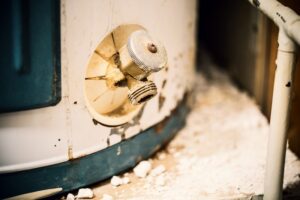When you have a water heater installed, you want it to be able to meet your daily hot water demands without running out of hot water too soon. But now you’re encountering a problem: your water heater isn’t meeting expectations. You may have noticed this during the mornings, when people in the household have started to go with lukewarm or even cold showers.
Why is your water heater running out of its hot water supply so quickly? There are several possible sources for this problem, and we’re going to examine them. You can rely on our team for water heater repair in Franklin County, and we have 24-hour emergency service available.
The water heater is the wrong size.
Is this a new water heater? If you’ve never gotten the amount of hot water you need from it, then it’s likely the problem is the size of the water heater—it doesn’t have the volume of hot water your home needs. This often happens because of amateur installations, and the only way to correct it is to hire trained professionals to replace the water heater with one that matches your daily household demands.
The dip tube has broken.
The dip tube is the tube that transports cold water down through the tank and to the heat exchanger at the bottom, where it gains heat. This tube can break, causing cold water to enter the top of the tank and get sent into the pipes going to the faucets so it seems that the water heater is running out of hot water too fast. Professionals can put in a new dip tube to fix this.
The heating element has burned out.
This problem occurs in electric water heaters. There are two heating elements in the tank to warm up the water and keep it warm. If one of these burns out or fails in any way, it will reduce the amount of hot water available. Technicians must replace the burnt-out heating element to restore hot water levels.
There’s sediment buildup.
Too much sediment in the freshwater supply can lead to a layer across the bottom of the tank. The layer will block the heat exchanger from effectively heating up the water and slow down how fast the system can replenish its hot water supply. Solving this problem is a basic one for technicians: they’ll arrange for a tank flush to remove the sediment. (We recommend tank flushes every few years.)
Aquastat problems
The aquastat is the thermostat for the water heater, and if it malfunctions it may shut the water heater off too soon when heating water. Please don’t attempt to tamper with the aquastat to overcome this problem, as there’s a risk of a scalding hazard. Leave the job of repairing it to the experts.
Water heater age
Finally, a decline in hot water volume is a major warning sign of a water heater that’s too old to work effectively anymore. If you have a water heater that is more than 12 years old, it’s in danger of starting to lose its heating capacity, resulting in less hot water available. We recommend you call us to examine your water heater and advise you regarding repairs or if it’s time to install a new water heater.
Contact JN Electrical Temperature Control, Inc and you’ll “Feel the Difference”!


